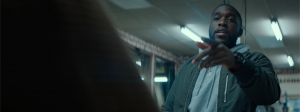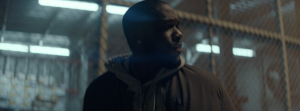Black people are three times more likely than white people to be killed by police and 50 percent more likely to be unarmed when killed (mappingpoliceviolence.org). To raise awareness of this issue and to offer a solution, Courageous Conversation Global Foundation (CCGF), the award-winning protocol for effectively engaging, sustaining and deepening interracial dialogue, will launch the “Not a Gun” campaign in Austin, Texas.
“Unconscious bias towards black people has been problematic among police for such a long time,” said Glenn Singleton, founder of Courageous Conversation Global Foundation. “To spark change and to ensure we all get home safely, we either need the police and the community to solve it together, or we need policy change. One way or the other, something has to happen.”
Corresponding to the cases involving Trayvon Martin (Skittles), Stephon Clark (a cell phone) and Eric Garner (cigarettes), the print and outdoor ads created by Goodby Silverstein & Partners (GS&P) for the campaign, picture products such as candy bars and cell phones in the hands of people of color, except with the twist that the products are labeled with the tag “Not a Gun.”
Coming out of this campaign, CCGF will partner with law-enforcement professionals to develop a training seminar called “Survival Options for Police and People” geared specifically to improving relationships between police departments and communities. Visitors to notagun.org can sign up for the training as well as sign a petition that encourages more effective unconscious-bias and de-escalation training for all police officers.

Additionally, a film directed by Kevin Foley at Rakish will be released that illustrates a scenario in which a black man orders a candy bar, just like his white counterparts, but instead of being handed candy, he’s handed a gun. The film highlights a disturbing issue that warrants heavier coverage, illustrating the unconscious yet overwhelming bias against people of color in situations where firearms are presumed to be present.
“The ‘Not a Gun’ campaign brings to life the issue of police officers taking black people to be holding guns when, in reality, they’re in possession of something harmless,” said Rony Castor, an associate creative director at GS&P. “Unconscious bias is a growing epidemic affecting this country, and we are hopeful that campaigns like this by Courageous Conversation will inspire police and community members to become trained and educated in a way that ultimately changes the narrative, saves lives and makes everyone feel safe.”
In fact, according to the Los Angeles Times, excessive use of force by police has become a leading cause of death for young black men in America.
“For a black man, a routine traffic stop shouldn’t make you feel all alone and make you wonder if you’ll walk away alive,” said Anthony O’Neill, an associate creative director at GS&P. “I’m hopeful this campaign can make an impact where it needs to and save lives.”
The media strategy aims to drive meaningful transformation in local communities that are rallying behind the change they want to see. The campaign will launch in Austin, Texas, to address existing issues with race after former assistant police chief Justin Newsom was reported to have used racial slurs at the end of last year. Local media will run from February 25 to March 22 with placements in broadcast, outdoor, print and digital media.

In addition to the ads, the effort aims to drive unconscious-bias training among police departments. Police officers spend seven times more training hours learning to shoot than learning to de-escalate (https://policeviolencereport.org/) despite the fact that de-escalation training, that is, using all conceivable means other than shooting, results in 25 percent fewer killings by police officers (https://mappingpoliceviolence.org/).
“There’s an inherent fear when it comes to police and people of color,” said Singleton. “It shouldn’t exist in 2020, but it does. I hope this campaign can shed some light on the issue of unconscious bias and spark some fruitful conversation around it. Then we can begin to end the problem completely.”
CCGF’s new course, which was codesigned with law-enforcement professionals, will invite participants to understand the world of the “threatening” other. Participants will be facilitated through processes using effective racial-equity “protocols” that support engaging one another in a way that results in everyone getting home safely.
“In talking with police officers, they know there’s a problem of mishandling of force against black people,” said Singleton. “The only way to solve it is for the community and police officers to come together as one. We are hopeful that ‘Not A Gun’ will lead to productive conversations, tangible actions, and will help in ending the problem completely.”
To prepare for the campaign and training, Courageous Conversation Global Foundation and Goodby Silverstein & Partners consulted Khalfani Yabuku, a retired Atlanta police commander, and author of “When the Thin Blue Line Begins to Blur.” In his book, Yabuku takes the readers on a journey of his struggles as a means to start the healing process between citizens and officers alike.
When asked about the effectiveness of the training, Yabuku stated, “This training has the ability to save lives. If officers approach the situation with a greater level of awareness, their reaction is going to take a different course. They won’t perceive everything as a threat.”

“Not a Gun” is one of many socially minded national campaigns created by GS&P. Most recently, the agency introduced Lessons in Herstory, which aims to rewrite the fact that 89 percent of content in history books today focuses on men. In recent years the agency has also taken on issues such as sexual assault on college campuses with the “Unacceptable Acceptance Letters” campaign and online bullying with the “I Am a Witness” campaign, which included the first emoji linked to a social cause.
About Courageous Conversation Global Foundation
COURAGEOUS CONVERSATION™ is an award-winning protocol for effectively engaging, sustaining and deepening interracial dialogue. Through its Framework for Systemic Racial Equity Transformation, Courageous Conversation Global Foundation is dedicated to helping leaders around the world address persistent racial disparities intentionally, explicitly and comprehensively.
COURAGEOUS CONVERSATION™ serves as the essential strategy for corporations, governments, school systems and other organizations to address racial disparities through safe, authentic and effective cross-racial dialogue.
Source: Rakish

You must be logged in to post a comment Login